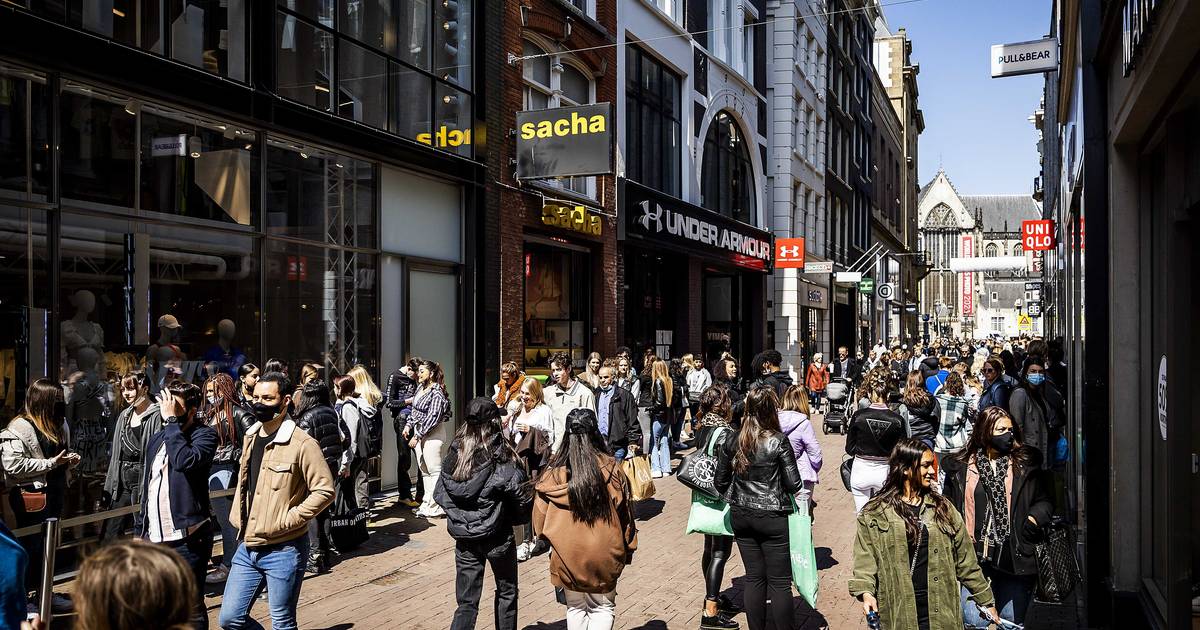Dutch retailer sales rose sharply in the second quarter. According to the Central Bureau of Statistics (CBS), this was an 8 percent increase compared to the same period the previous year. The increase is especially noticeable in clothing and shoe stores. Entrepreneurs were more optimistic than ever at the start of the third quarter. However, there is a big problem: it is difficult to find employees.
Clothing store sales volume grew by 40 percent, followed by stores selling footwear and leather goods by 25 percent. It should be noted that this sector was severely affected by the Corona crisis in the second quarter of 2020. In the last quarter, sales were still below the level they were before the Corona crisis.
Stores selling consumer electronics had slightly lower annual sales last quarter. The same was true for DIY stores. The sales volume in these stores is still much higher than it was before the Corona crisis.
Since the start of the Corona crisis, supermarkets and specialty food stores have recorded a higher quarterly turnover compared to the previous year. This is because customers spent more money on more luxurious products because the restaurant industry remained closed for large parts of 2020. The food sector continued to grow in the past quarter, with business volume increasing by less than 1 percent.
Online sales were up 17 percent in the second quarter from a year earlier. In the first quarter, Internet sales rose 85 percent. Internet sales have increased sharply since the outbreak of the Corona virus in March 2020. Now that the Corona year is completely over, the growth rate in the second quarter is again comparable to what it was before the Corona crisis.
Business confidence in registration
Entrepreneurs were more upbeat than ever about the economy at the start of the third quarter. Catering entrepreneurs in particular are becoming more positive, reports the Central Bureau of Statistics (CBS). This is partly due to the Statistical Office’s rising index to its highest level since measurements began in 2008.
The rise in confidence is linked to the reopening of the economy. For example, catering companies can only receive guests back for a few months. Entrepreneurs in this sector moved from the darkest group to the most optimistic in a single quarter.
Entrepreneurs have also become more optimistic in almost all other industries, with the exception of construction. The mood there is still positive, but just below a quarter previously.
However, more entrepreneurs are suffering from a shortage of employees. This applies to about a quarter of companies. However, about a third of entrepreneurs indicated that they did not encounter any obstacles in their business operations.
In the second quarter of this year, business confidence rose above zero for the first time since the start of the Corona crisis. Above this, entrepreneurs have a mostly positive view of economic developments, less so there is pessimism. Now, three months later, there is immediately talk of a new record. The old distinction dates back to the beginning of 2018.
To measure confidence in business, CBS works alongside the Chamber of Commerce, the Economic Institute for Building, MKB-Nederland, and VNO-NCW.
ABN AMRO: More and more vacancies cannot be filled
The economic bureau of ABN AMRO also concluded in a report on the labor market that more and more vacancies could not be filled. According to economists, the recovery from the crisis shows that there is a growing mismatch in the labor market.
It is becoming increasingly difficult to find the right employees, particularly in the construction and care sectors. The energy sector also suffers from a structural deficiency. This includes a shortage of maintenance technicians for machines, nurses, programmers, and mechanics in mechanical engineering.
According to ABN AMRO, 16.5 percent of current vacancies cannot be filled. This percentage is higher than it was before the outbreak of the crisis. When it comes to not being able to fill vacancies, ABN AMRO looks at the travel distance job seekers are willing to travel, among other things.
Economists explain that there has also been a staff shortage during the crisis. This was in part due to support measures from the government, so that people remain reassured to work. According to ABN AMRO, this prevented a wave of layoffs. On the other hand, the number of vacancies rose sharply. Forklift drivers, cleaners, bike couriers and traffic controllers have increased the most.
Furthermore, ABN AMRO believes that the staff shortage in the catering industry will be persistent. During the crisis, many workers left the sector. It remains to be seen if they will return now that catering establishments are allowed to receive guests again. Furthermore, ABN AMRO is dependent on the growing shortage of personnel in the industry.
Unlimited free access to Showbytes? And that can!
Log in or create an account and never miss any of the stars.







